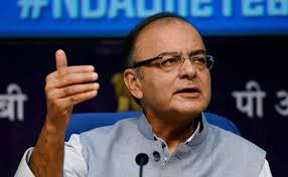 NEW DELHI: Indian Finance Minister Arun Jaitley on Wednesday said he wants the GST to be implemented from April next year, but warned that the new indirect tax regime may get delayed by sometime if Congress continues to obstruct it.
NEW DELHI: Indian Finance Minister Arun Jaitley on Wednesday said he wants the GST to be implemented from April next year, but warned that the new indirect tax regime may get delayed by sometime if Congress continues to obstruct it.
Speaking at an event organized by The Economist magazine here, Jaitley said if the number of parties which supported the Goods and Services Tax (GST) Bill in Lok Sabha are tallied, the government has “two-third” majority support in Rajya Sabha as well.
“The Congress party says — I will only shout down… I would like to see it being implemented by April 1, but if this kind of obstructionism remains, perhaps the Congress party will succeed in hurting Indian economy and derail the GST for sometime.
“But now GST is almost a fortified agenda. The objections being raised I don’t see much substance in them. So I don’t see much time before this is passed,” he said.
Congress on Tuesday virtually red-flagged government’s attempts to call a special session of Parliament, telling it bluntly such an exercise would serve no purpose unless action was taken against Indian External Affairs Minister Sushma Swaraj and chief ministers of north-Indian state Rajasthan, central-Indian state Madhya Pradesh and Chhattisgarh.
The Constitution Amendment Bill for roll out of GST has been passed in Lok Sabha, but is yet to be approved by Rajya Sabha where the ruling BJP does not enjoy majority of its own.
The Finance Minister also said the composition of Upper House would change after the next bi-annual election in April in favor of the ruling alliance.
As of now, Congress has maximum members in Rajya Sabha.
The government plans to roll out GST, which seeks to replace all indirect taxes with a uniform levy, by April 1, 2016. GST is estimated to boost India’s GDP by 1-2 per cent.
Jaitley further said the government has embarked on a certain course and on that course in current circumstances “we are doing reasonably well.”
“You had a Parliament session which was wasted.
Conventionally it has been that it is politically costly to pursue reforms. But this time you had much larger public opinion in favor of that Parliament should be allowed to enact a law particularly with regard to indirect taxation GST,” he added.–PTI





